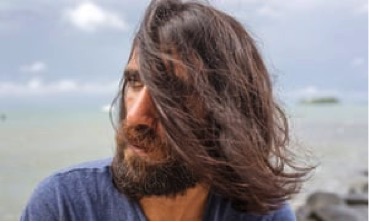|
Behrouz Boochani: detained asylum seeker wins Australia's richest literary prize

Written by Helen Davidson, Photograph: Jonas Gratzer for the Guardian
Behrouz Boochani, held on Papua New Guinea’s remote Manus Island, could not physically attend his book launch on Thursday night.
Guardian writer on Manus Island wins $125,000 after sweeping non-fiction prize and Victorian prize for literature at Victorian premier’s literary awards 2019
The Kurdish Iranian writer’s book was sent largely via messaging services such as Whatsapp over almost five years
The winner of Australia’s richest literary prize did not attend the ceremony. His absence was not by choice. He is is not allowed into Australia.
Behrouz Boochani, whose debut book won both the $25,000 non-fiction prize at the Victorian premier’s literary awards and the $100,000 Victorian prize for literature on Thursday night.
The Kurdish Iranian writer is an asylum seeker who has been kept in purgatory on Manus Island in Papua New Guinea for almost six years, first behind the wire of the Australian offshore detention centre, and then in alternative accommodation on the island.
Now his book No Friend But the Mountains – composed one text message at a time from within the detention centre – has been recognised by a government from the same country that denied him access and locked him up.
A Kurdish Iranian writer sought refuge in Australia but was instead sent to the country’s notorious offshore detention centre. For the next five years he wrote a book, one text message at a time.
Behrouz Boochani became a well known and award-winning voice from Papua New Guinea’s remote Manus Island, acting as a source for journalists in Australia and internationally, writing his own articles and creating a movie, Chauka, Please Tell Us The Time.
Boochani is one of thousands of asylum seekers to be sent to offshore processing camps in Papua New Guinea, or the tiny Pacific Island nation of Nauru, under Australia’s policy, which was developed to stop the growing number of people seeking asylum by boat.
Writing from Manus prison: a scathing critique of domination and oppression Boochani could not physically attend his book launch on Thursday night because the Australian government has refused to let him or the thousands of others in the same situation over the past five years settle in the country. He Skyped in instead from the refugee accommodation centre where he lives in East Lorengau.
It is, he said, “a paradoxical feeling”.
“I really don’t know what to say,” he told Guardian Australia in a conversation before the main award was announced, when he only knew of the non-fiction prize. “I certainly did not write this book just to win an award.
Behrouz Boochani, Manus Island and the book written one text at a timeRead more“My main aim has always been for the people in Australia and around the world to understand deeply how this system has tortured innocent people on Manus and Nauru in a systematic way for almost six years. I hope this award will bring more attention to our situation, and create change, and end this barbaric policy.”
Boochani speaks via text messages, because his internet connection keeps cutting out – the same method he used to write the book, an autobiographical account of his attempt to make the journey from Indonesia to Australia and his subsequent incarceration.
Under Australia’s hardline immigration policy, asylum seekers who try to reach the country by boat are processed at offshore centres.AdvertisementFor an asylum seeker kept in offshore detention to win such a major prize “brings enormous shame to the Australian government”, he said.
Accepting the award on Boochani’s behalf was his translator, Omid Tofighian, who worked with interpreter Moones Mansoubi to translate Boochani’s Farsi text to English.
“You can’t underestimate the impact that [this win] will have on Australian politics and Australian refugee politics – not only in Australia [but for] displaced and exiled people all over the world,” Tofighian said.
“This is one of the most vicious forms of neocolonial oppression that is taking over the world at the moment – and to address this book in this way and to recognise it and draw attention to the narrative it is presenting will have repercussions for many generations to come.”
The awards are split into seven categories, which are judged by a panel. In 2017 and 2018, women won each category, and they dominated the winners’ list again this year, with Elise Valmorbida winning the fiction prize with The Madonna of the Mountains; Kendall Feaver winning the drama prize for her play The Almighty Sometimes; Kate Lilley winning the poetry prize for Tilt; Victoria Hannan winning the $15,000 unpublished manuscript prize for Kokomo; and Bri Lee winning the people’s choice award for her memoir Eggshell Skull.
|
Helen Davidson, The Guardian, 02/02/2019
|
|
|
|
The Mary Initiative
A Bridge of Understanding
Operational, Safety, Security & First Aid Training for NGO's
|
|
|
|